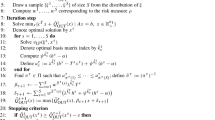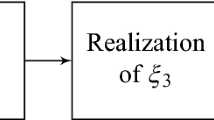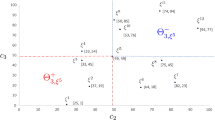Abstract
Mean-risk stochastic programs include a risk measure in the objective to model risk averseness for many problems in science and engineering. This paper reports a computational study of mean-risk two-stage stochastic linear programs with recourse based on absolute semideviation (ASD) and quantile deviation (QDEV). The study was aimed at performing an empirical investigation of decomposition algorithms for stochastic programs with quantile and deviation mean-risk measures; analyzing how the instance solutions vary across different levels of risk; and understanding when it is appropriate to use a given mean-risk measure. Aggregated optimality cut and separate cut subgradient-based algorithms were implemented for each mean-risk model. Both types of algorithms show similar computational performance for ASD whereas the separate cut algorithm outperforms the aggregated cut algorithm for QDEV. The study provides several insights. For example, the results reveal that the risk-neutral approach is still appropriate for most of the standard stochastic programming test instances due to their uniform or normal-like marginal distributions. However, when the distributions are modified, the risk-neutral approach may no longer be appropriate and the risk-averse approach becomes necessary. The results also show that ASD is a more conservative mean-risk measure than QDEV.



Similar content being viewed by others
References
Ahmed, S.: Convexity and decompostion of mean-risk stochastic programs. Math Program 106(3), 433–446 (2006)
Artzner, P., Delbean, F., Eber, J., Heath, D.: Coherent measures of risk. Math Finance 9, 203–228 (1999)
Dantzig, G.: Linear programming and extensions. Princeton University Press, Princeton (1963)
de Oliveira, W., Sagastizabal, C.: Level bundle methods for oracles with on-demand accuracy. Optim Meth and Soft 29, 1180–1209 (2014)
Fabian, C., Wolf, C., Koberstein, A., Suhl, L.: Risk-averse optimization in two-stage stochastic models: computational aspects and a study. SIAM J Optim 25, 28–52 (2015)
Higle, J., Sen, S.: Stochastic decomposition. Kluwer Academic Publishers, 101 Phillip Drive, Norwell, MA 02061 (1996)
IBM: CPLEX 12.1 IBM ILOG CPLEX Callable Library Version 12.1 C API Reference Manual. IBM, USA (2009)
Konno, H., Yamazaki, H.: Mean-absolute deviation portfolio optimization model and its applications to tokyo stock market. Manag Sci 37(5), 519–531 (1991)
Kristoffersen, T.: Deviation measures in linear two-stage stochastic programming. Math Methods Oper Res 62(2), 255–274 (2005)
Krokhmal, P., Zabarankin, M., Uryasev, S.: Modeling and optimization of risk. Surv Oper Res Manag Sci 16, 49–66 (2011)
Linderoth, J., Wright, S.: Decomposition algorithms for stochastic programming on a computational grid. Comput Optim Appl 24(2), 207–250 (2003)
Linderoth, J., Shapiro, A., Wright, S.: The empirical behavior of sampling methods for stochastic programming. Ann Oper Res 142, 215–241 (2006)
Louveaux, F., Smeers, Y.: Numerical techniques for stochastic optimization problems. In: Ermoliev, Y., Wets, R. (eds.) Optimal investments for electricity generation: a stochastic model and a test problem, pp. 445–452. Springer-Verlag, Berlin (1998)
Mak, W., Morton, D., Wood, R.: Monte carlo bounding techniques for determining solution quality in stochastic programs. Oper Res Lett 24, 47–56 (1999)
Märkert, A., Schultz, R.: On deviation measures in stochastic integer programming. Oper Res Lett 33(5), 441–449 (2005)
Markowitz, H.: Portfolio selection. J Finance 7(1), 77–91 (1952)
Miller, N.: Mean-risk portfolio optimization problems with risk-adjusted measures. Dissertation, The State University of New Jersey (2008)
Mulvey, J., Ruszcynski, A.: A new scenario decomposition method for large scale stochasitc optimization. Oper Res 43, 477–490 (1995)
Ogryczak, W., Ruszcynski, A.: Dual stochastic dominance and related mean-risk models. SIAM J Optim 13, 60–78 (2002)
Rockafellar, R.T., Uryasev, S.: Optimization of conditional value-at-risk. J Risk 2, 21–41 (2000)
Ruszcynski, A., Shapiro, A.: Optimization of convex risk functions. Math Oper Res 31(3), 433–452 (2006)
Schultz, R.: Stochastic programming with integer variables. Math Program 97, 285–309 (2003)
Schultz, R., Neise, F.: Algorithms for mean-risk stochastic integer programs in energy. Revista Investig Operacional 28(1), 4–16 (2007)
Schultz, R., Tiedemann, S.: Risk aversion via excess probabilities in stochastic programs with mixed-integer recourse. SIAM J Optim 14(1), 115–138 (2003)
Schultz, R., Tiedemann, S.: Conditional value-at-risk in stochastic programs with mixed-integer recourse. Math Program 105, 365–386 (2006)
Sen, S., Doverspike, R., Cosares, S.: Network planning with random demand. Telecommun Syst 3(1), 11–30 (1994)
Shapiro, A., Ahmed, S.: On a class of minimax stochastic programs. SIAM J Optim 14(4), 1237–1249 (2004)
Acknowledgments
The authors would like to thank the anonymous referees who provided valuable comments that helped improve this paper. The first author was supported in part by a Graduate Assistantship in Areas of National Need (GAANN) Fellowship.
Author information
Authors and Affiliations
Corresponding author
Rights and permissions
About this article
Cite this article
Cotton, T.G., Ntaimo, L. Computational study of decomposition algorithms for mean-risk stochastic linear programs. Math. Prog. Comp. 7, 471–499 (2015). https://doi.org/10.1007/s12532-015-0088-0
Received:
Accepted:
Published:
Issue Date:
DOI: https://doi.org/10.1007/s12532-015-0088-0




